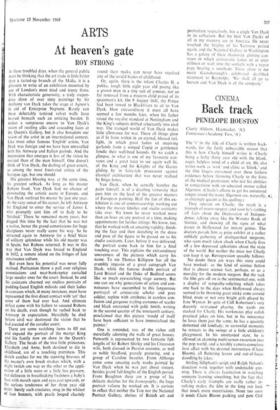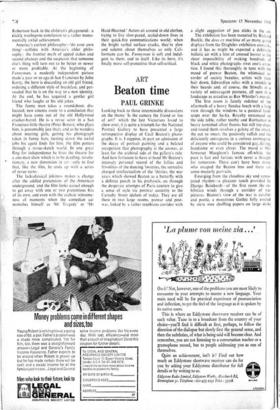CINEMA
Back track
PENELOPE HOUSTON
Charly (Odeon, Haymarket, 'A') Funnynian (Academy Two, 'A')
The `r.' in the title of Charly is written back- wards, for the fairly unbearable reason that
this is how Charly himself writes it—Charly being a hefty thirty year old with the blank, eager, helpless mind of a child of six. He also
writes work as `wirk' and clinic as 'klinik,' and the film lingers entranced over these forlorn evidences before throwing Charly to the lions of the medical profession, who test his abilities in competition with an educated mouse called Algernon. (Charly's efforts to get his untutored tongue round the name Algernon are, naturally, (a. as cloyingly quaint as his spelling.) They operate on Charly; the result is a triumph of neuro-surgery; and soon he's rattling off facts about the Declaration of Indepen- dence, talking away like the Wonder Book of Science, and showing all the signs of what passes in Hollywood for instant genius. The doctors parade him as prize exhibit at a rather unlikely gathering of distinguished surgeons, who seem much taken aback when Charly fires off a few depressed aphorisms about the state of the world. But neither the mice nor Charly can keep it up. Retrogression speedily follows.
No doubt there are ways this story could have worked : as the kind of science fiction that is almost science fact, perhaps, or as a morality for the modern surgeon. But the tack the film gets off on is the sentimental one, with a display of sympathy-soliciting which takes one back to the days when Hollywood always seemed to be throwing great sticky arms around blind, mute or not very bright girls played by Jane Wyman. In spite of Cliff Robertson's very decently restrained playing, the cards are stacked for Charly. His workmates play oafish practical jokes on him, but in his innocence he loves them just the same; he has a quaintly demented old landlady; in sorrowful moments he retreats to the swings at a little children's playground. In his unretarded state, he is allowed an alarming multi-screen excursion into the pop world, and a terribly camera-conscious love affair with his devoted instructress (Claire Bloom), all fluttering leaves and out-of-focus dawdling by lakes.
Stirling Silliphant's script and Ralph Nelson's direction work together with .undeniable cun- ning. There is always fascination in watching someone learning something, but the fact that Charly's early triumphs are really rather in- volving makes the film in the long run look that much more meretricious. None too soon it sends Claire Bloom packing and puts Cliff
Robertson back in the children's playground: a slickly woebegone conclusion to a rather monu- mentally awful achievement.
America's current philosophy—'do your own thing'—collides with America's older philo- sophy: the frontier myth of upped stakes and second chances and the suspicion that someone else's thing will turn out to be better or newer or more profitable. At the beginning of Funnyman, a modestly independent picture made a year or so ago in San Francisco by John Korty, the hero is discarding an old girl friend, ordering a different style of breakfast, and per- suaded that he is on the way to a new identity. At the end, he has acquired a gentler girl friend who laughs at his old jokes.
The funny man takes a roundabout, dis- located, new cinema route to a conclusion that might have come out of the old Hollywood cracker-barrel. He is a revue actor in a San Francisco little theatre (Peter Bonerz, who plays him, is presumably just that), and as he wanders about meeting girls, getting his photograph taken in funny hats, turning down the awful jobs his agent finds for him, the film potters through a revue-sketch world. In one great fling for independence he hires the theatre for a one-man show which is to be dazzling, revolu- tionary, a new dimension in art—only to find that, like the film, he ends up with a series of revue turns.
The lackadaisical -jokiness makes a change after the addled pretensions of the American underground, and the film looks casual enough to get away with one or two pretentious bits of its own, and even with the archaic winsome- ness of moments when the comedian ad- monishes himself as `Mr Tragedy' or `Mr Hard-Hearted.' Actors sit around in old clothes, trying to live slow-paced, scaled-down lives in their quick-fire communications world; when the bright verbal surface cracks, they're slow and solemn about themselves as only Cali- fornians can be. Funnyman is soft and indul- gent to them, and to itself. Like its hero, it's finally more self-protective than self-critical.







































 Previous page
Previous page